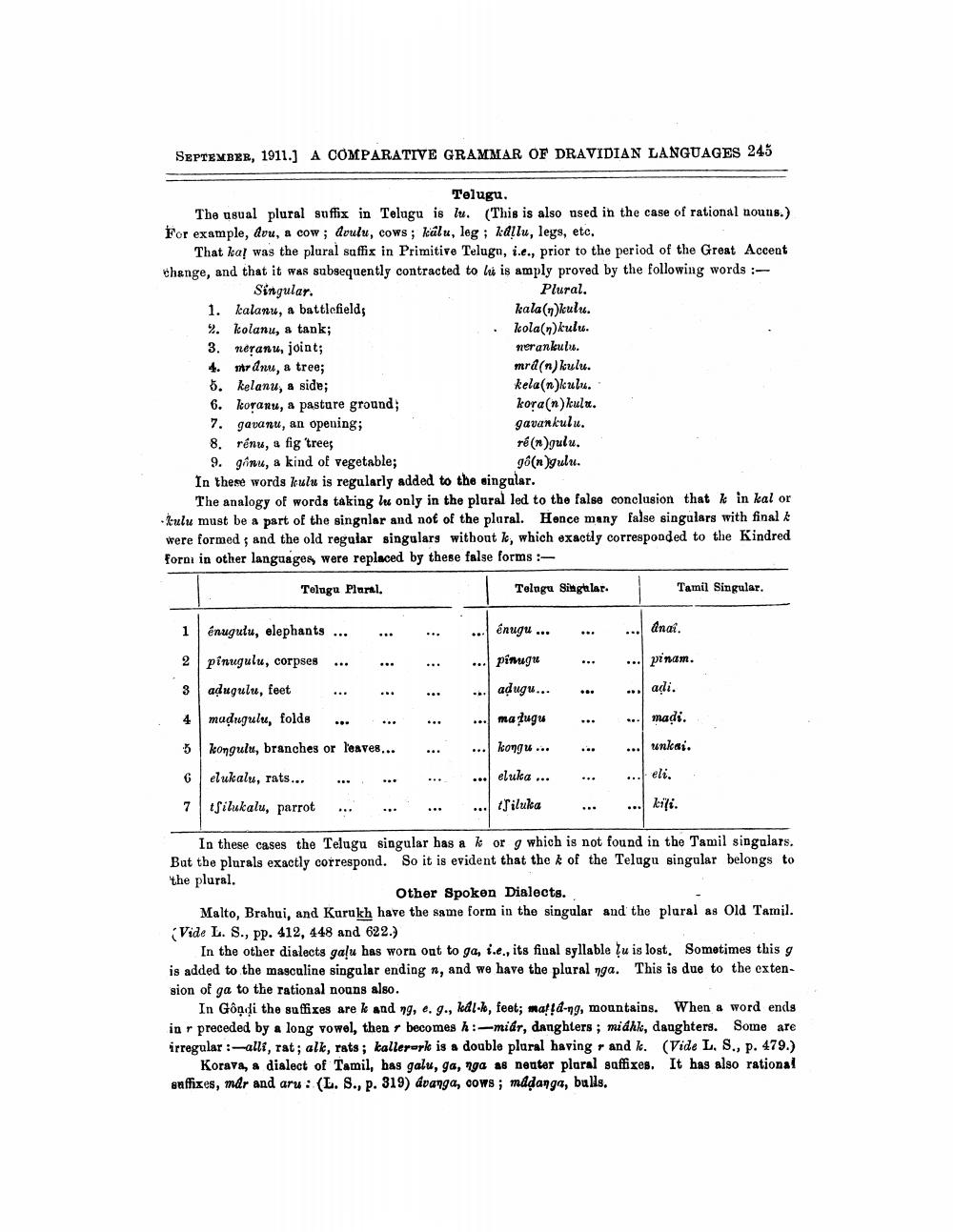________________
SEPTEMBER, 1911.) A COMPARATIVE GRAMMAR OF DRAVIDIAN LANGUAGES 245
Telugu. The usual plural suffix in Telugu is lu. (This is also used in the case of rational nouns.) For example, avu, a cow; dvulu, cows; kálu, leg : kallu, legs, etc.
That ka! was the plural suffix in Primitive Telugn, i.e., prior to the period of the Great Accent change, and that it was subsequently contracted to lui is amply proved by the following words :Singular.
Plural. 1. kalanu, a battlefields
kala(n)kulu. 2. kolanu, a tank;
kola(n)kulu. 3. neranu, joint;
nerankulu. Ihr dnu, a tree;
mrd(n) kulu. kelanu, a side;
kela(n)kulu. 6. korart, a pasture ground;
kora(n)kulu. 7. gavanu, an opening;
gavarkulu. 8. rénu, a fig trees
té (ne)gulu. 9. ganu, a kind of vegetable;
gô(ngulu. In these words kulu is regularly added to the singular.
The analogy of words taking in only in the plural led to the false conclusion that ke in kal or -Kulu must be a part of the singnlar and not of the plural. Hence many false singulars with final k were formed and the old regular singulars without k, which exactly corresponded to the Kindred forn in other languages were replaced by these false forms :
Telugu Plural.
Telugu Singtılar.
Tamil Singular.
énugu...
Anai. pinam.
pínugu
adi.
énugulu, elephants ... ... pinugulu, corpses adugulu, feet madugulu, folds ... kongulu, branches or leaves... elukalu, rats... ... ... tfilukalu, parrot ... ...
adugu... ma lugu kongu ...
eluka ... ... tSiluka
madi.
unkai. ...eli.
...
7
...
...
...
killi.
In these cases the Telugu singular has a k or g which is not found in the Tamil singulars. But the plurals exactly correspond. So it is evident that the k of the Telugu singular belongs to the plural.
Other Spoken Dialects. Malto, Brahui, and Kurukh have the same form in the singular and the plural as Old Tamil. Vide L. S., pp. 412, 448 and 622.)
In the other dialects galu has worn out to ga, i.e., its final syllable (u is lost. Sometimes this g is added to the masculine singular ending n, and we have the plural nga. This is due to the extension of ga to the rational nouns also.
In Gôndi the suffixes are k and ng, e. g., kd1%, feet; maid-ng, mountains. When a word ends in r preceded by a long vowel, then becomes h:-midr, danghters; midhl, daughters. Some are irregular :-alli, rat; all, rats; kallerark is a double plural having and l. (Vide L. S., p. 479.)
Korava, a dialect of Tamil, bas galu, ga, nga as neuter plural suffixes. It has also rational suffixes, mar and aru : (L. S., p. 319) avanga, cows; mddanga, bulls.




